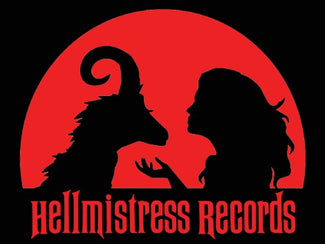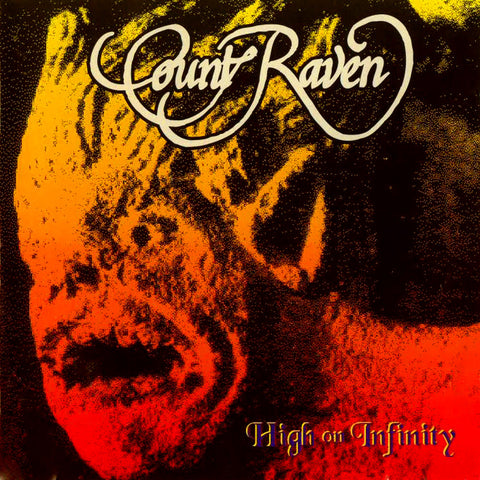Special Feature: Includes the bonus track, "Chrittes Triumph".
Tracklisting:
- Jen
- Children's Holocaust
- In Honour
- The Madman From Waco
- Masters of All Evil
- Ode to Rebecca
- High on Infinity
- An Ordinary Loser
- Traitor
- The Dance
- The Coming
- Lost World
- Cosmos
- Chrittes Triumph (Bonus Track)
Release Date: 2005
Label: Cyclone Empire
Origin: Germany
Count Raven are sort of stuck in a place between traditional and epic doom, exhibiting characteristics of both, and yet never quite coming across as either. It is really difficult to describe exactly what it is that is traditional about them, other than the similarities that they share with Black Sabbath in terms of pacing, lyrical subject matters, and the stereotypical deep toned guitar sound that is common to all in the greater doom genre. In essence, they have established themselves as a force unto themselves, being obscured by the simple fact that there are other bands in this genre that took more time honing an individual aspect of Sabbath’s pioneering works and turning it into something easier to grasp, rather than adopting the same overall approach to sound exploration and allowing the winds of fate to take them to a number of possible places.
Ever since guitarist and multi-instrumentalist Dan Fondelius took the vocal reigns, the accusations of overt Black Sabbath worship have been rolling in from many critical quarters. Truth be told, he does have a voice that is extremely similar to Ozzy’s was circa 1983, and his melodies do tend to resemble the prince of darkness’ follow the riff or sing what sounds like its own riff approach that was common to their early 70s material. But the similarities don’t tend to go much further than that, barring the same free spirited and loose approach to songwriting that involves touching several avenues of psychedelic, rock, heavy metal, and ambient music. I would personally go so far as to compare Fondelius as a musician more to Manilla Road’s Mark Shelton, whose guitar playing is much wilder than that of Iommi’s, whose keyboard oriented works were far more outer space-like than Sabbath’s most keyboard heavy 70s composition, and whose riffs tend to be a bit more droning and epic, at least insofar as Sabbath’s 70s music goes.
For all of the constant harping at the band being Sabbath clones, their opening song on 3rd album and masterpiece “High On Infinity” does not really sound like anything the band did in the 70s. As best as can be gathered, “Jen” is something along the lines of a late 80s Candlemass song, but without the operatic trappings and more of an ambient aesthetic, even when compared to said band’s debut. It highlights a very minimalist approach to riffing, relying completely on the resulting dark atmosphere created by the arrangement to give Fodde his pulpit for a somber storytelling event. Keyboards filter in and out at various points, trading blows here and there with a droning wah pedal guitar riff, both of which have an affect of masking the fact that a singular riff is basically dominating the whole song with a veil just thin enough to be translucent, but not enough to be transparent or otherwise immediately obvious. Essentially the band has created an involved listen out of 2 different riffs, a really loose drum line that follows a Bill Ward approach to drum fills, placing them at somewhat odd intervals.
Throughout the entire listen there are many instances where Candlemass seems to be the more dominant influence, rather than Sabbath. “Children’s Holocaust” starts off with one of those really mellow and melancholy clean guitar intros that made “Solitude” such an expressive work. At the beginning the vocals don’t immediately take on an Ozzy tinge, but definitely resemble that of Johan Langquist. When the heavy riffs kick in and things get moving, the general drive of the song is not terribly animated, but again goes through that slow, coasting sort of doom tempo that Sabbath only occasionally dabbled in on their self-titled song and a few others on various albums. Others that tend to take on this persona include the conspiratorial and somewhat more keyboard oriented “Masters Of All Evil” and the super heavy and droning “The Coming”. Meanwhile, the band all but completely leaves the Candlemass similarities for something a bit closer to St. Vitus or Trouble with “Lost World” and actually somewhat hitting on a late 80s to early 90s Sabbath sound on the album’s title track.
The one area where Count Raven really departs from a lot of the elements of what is referred to as traditional doom is on the ambient sounding compositions. Chief among these is the closing song “Cosmos”, which is essentially all keyboards, and surpasses “Planet Caravan” as the most tripped-out and dreamy sounding work of music. There are likely many interesting places in the ambient world where these sorts of intergalactic sounding orchestrations are done in such an unusual manner, but I doubt any of them flow with this sort of song oriented structure. Fondelius’ vocals are as repetitive as the 3 chords being banged out at the bottom of the synthesizer arrangement, but the lyrics are particularly peculiar, essentially putting forth a sort of prophet’s message from the creator being responsible for the formation of the universe. There is a very interesting and early Manilla Road sounding work in “The Dance” also that trips out the ears, but basically “Cosmos” leaves the final impression, if not merely for its placement on the album but also in the complex yet repetitive orchestrations exploited.
The accessibility factor is a big part as to why there isn’t a whole lot of talk about this band, in amongst traditional doom fans. It isn’t merely that Count Raven is being overshadowed by any one particular band from Trouble to Candlemass, but that they’ve adopted a cult-like nature that is very similar to what Manilla Road has embodied on their past 4 albums since reforming. I’d put this particular album up in the same league as “Spiral Castle” in terms of both originality and artistic merit, though they are in fairly different styles. But one thing is definitely certain, this is the sort of music that definitely deserves a bigger audience, but probably will never really get one except for maybe decades after the band goes defunct. - hells_unicorn

